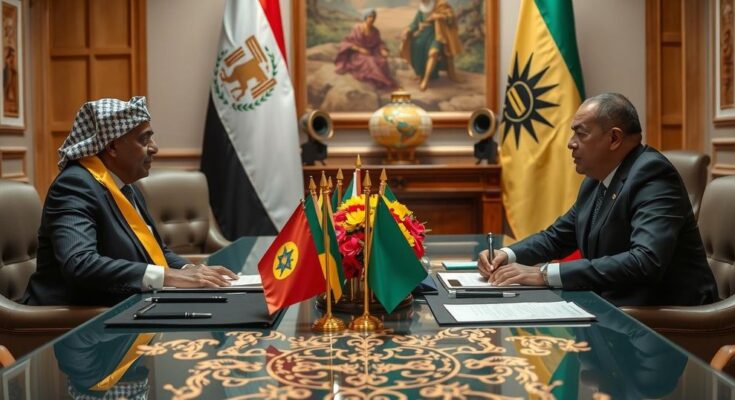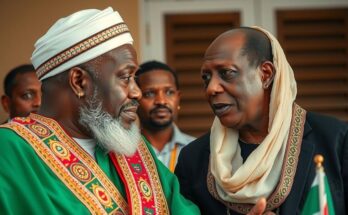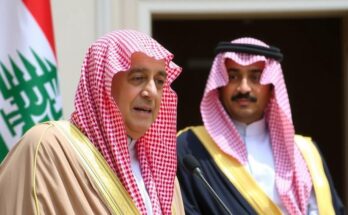Ethiopia seeks to replace Somalia’s Foreign Minister Ahmed Fiqi, facing resistance from Egypt as Somali President Hassan Sheikh Mohamud visits Ethiopia to restore diplomatic ties. This tension reflects ongoing geopolitical rivalries, particularly regarding Somalia’s relationships with Puntland and Jubaland, crucial for regional security. President Hassan Sheikh’s foreign policy faces criticism for its inconsistency, jeopardizing Somalia’s sovereignty in the ongoing power struggles.
Amidst escalating tensions regarding Somalia’s foreign relations, recent developments indicate that Ethiopian officials are advocating for the replacement of Somalia’s Foreign Minister, Ahmed Fiqi. This proposed change, however, is encountering strong opposition from Egypt, complicating the political landscape for Somalia’s government. In the wake of this contention, Somali President Hassan Sheikh Mohamud is visiting Ethiopia, where he is welcomed by Prime Minister Abiy Ahmed, and the two leaders have mutually agreed to restore formal diplomatic ties.
Foreign Minister Fiqi is notably absent from this significant diplomatic visit as he engages in discussions with his Egyptian and Eritrean counterparts in Cairo, focusing on enhancing alliances against perceived Ethiopian dominance in the region. As a consequence of this situation, the Somali delegation to Ethiopia includes Minister of State for Foreign Affairs instead. It has been reported that Ali Balcad, who is a close advisor to the President, is now tasked with managing relations with Ethiopia.
Experts speculate that President Hassan Sheikh’s diplomatic approach is aimed at diminishing the influence of Somali federal member states, particularly Puntland and Jubaland, that historically maintain robust relationships with Ethiopia. These territories have been essential to regional security, acting as buffers against threats posed by militant groups. Recently, Somalia’s agreement to include Ethiopian troops in an updated African Union peacekeeping mission has underscored Ethiopia’s continued role in Somali security matters.
Cairo’s opposition to Ahmed Fiqi’s potential removal underscores the broader geopolitical contest within the Horn of Africa, as Egypt has cultivated a trilateral alliance with Somalia and Eritrea to counter Ethiopia’s expanding influence. This political friction is not new; previous instances have seen accusations against Somali officials for being excessively aligned with Egyptian interests, raising concerns about the future of Ahmed Fiqi.
The administration of President Hassan Sheikh is facing increasing criticism regarding its foreign policy, which many experts claim lacks coherence and appears to be centered around personal gains rather than a cohesive national strategy. This inconsistency is perceived to create vulnerabilities that allow external powers to interfere in Somalia’s domestic affairs, ultimately threatening its sovereignty and recovery efforts from prolonged conflict. As Ethiopia and Egypt both jockey for influence within Somalia, the precarious political status quo reflects the wider geopolitical rivalries that are currently shaping the Horn of Africa.
The Horn of Africa has become a focal point of geopolitical tension, particularly as Ethiopia and Egypt vie for influence over Somalia. Ethiopia has historically maintained essential security ties with Somali federal member states, specifically Puntland and Jubaland, which have been crucial in countering threats from militant groups. Simultaneously, Egypt seeks to assert its influence through a trilateral alliance with Somalia and Eritrea as a counterbalance to Ethiopia’s regional dominance. These dynamics have rendered Somali officials, especially members of the foreign ministry, susceptible to external pressures, complicating Somalia’s foreign policy and national sovereignty.
In summary, the political environment in Somalia is markedly strained as Ethiopia and Egypt compete for influence, impacting internal diplomatic decisions and exacerbating existing tensions between the national government and federal member states. The conflict surrounding Foreign Minister Ahmed Fiqi’s potential replacement spotlights the delicate balance of power that Somalia must navigate. President Hassan Sheikh’s administration faces significant challenges, with its foreign policy under scrutiny and external interferences threatening the nation’s stability and progress.
Original Source: www.garoweonline.com




